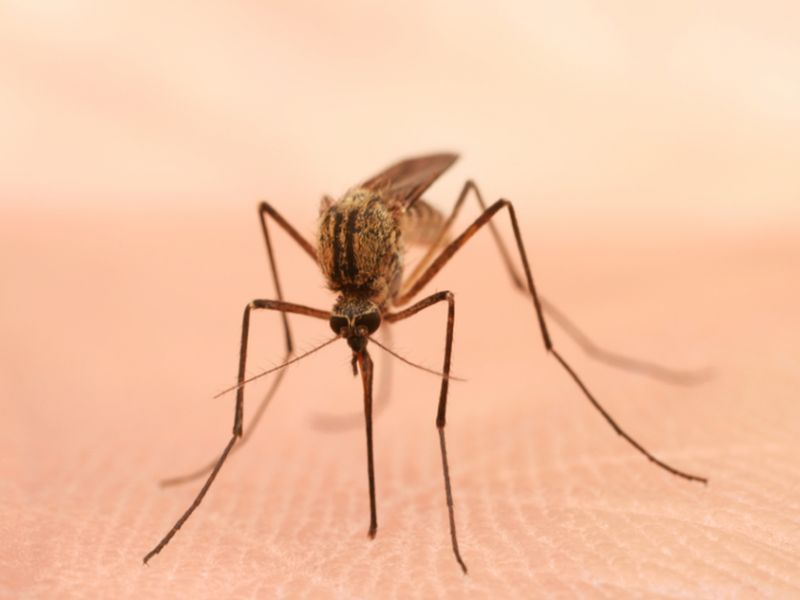Mosquito-Borne Virus May Cause Fatal Brain Infection
Chikungunya outbreak on Reunion Island finds encephalitis more common than previously believed
HealthDay Reporter

WEDNESDAY, Nov. 25, 2015 (HealthDay News) -- The mosquito-borne virus chikungunya can cause severe and potentially fatal brain infection in some patients, particularly infants and people older than 65, according to a new report.
A 2005-2006 chikungunya outbreak on Reunion Island, east of Madagascar in the Indian Ocean, sickened more than 300,000 people. It also provided the first serious demonstration of the virus' ability to cause encephalitis, researchers report online Nov. 25 in the journal Neurology.
Americans who contract chikungunya usually acquire the virus while traveling. The first locally transmitted case occurred in Florida in 2014, according to the U.S. Centers for Disease Control and Prevention.
The rate of chikungunya-associated encephalitis in the Reunion Island outbreak outpaced the rate reported in the United States for all encephalitis between 1998 and 2010, researchers found.
Prior to the Reunion Island outbreak, chikungunya had been considered a nonfatal virus that caused encephalitis only in very rare cases, said lead author Dr. Patrick Gerardin, a pediatrician and epidemiologist with Central University Hospital in Saint Pierre on Reunion Island.
But 57 patients fell ill with diseases of the central nervous system due to the Reunion Island chikungunya outbreak, including 24 who developed encephalitis, researchers report.
Nearly 17 percent of the chikungunya encephalitis patients died, and up to 45 percent of children wound up with long-term disabilities from their brain inflammation. These included behavioral changes or difficulty thinking and remembering, the researchers said.
"These data are of paramount importance for public health stakeholders and policymakers because now chikungunya threatens the New World with possibilities of epidemics in South, Central and even North America," Gerardin said.
Chikungunya is a re-emerging virus that has expanded from Indian Ocean locations like Reunion Island into areas closer to the United States, said Dr. Amesh Adalja, a senior associate at the University of Pittsburgh's UPMC Center for Health Security in Baltimore.
"We've seen in the last two years or so a really explosive chikungunya outbreak in the Americas, particularly in the Caribbean and South America," Adalja said. "That has much more of an impact on the United States, because the travel between Puerto Rico or the Virgin Islands or St. Martin and the United States is very high."
In 2014 and 2015, about 12 people have fallen ill with chikungunya in Florida, thanks to mosquitoes passing along the disease from infected travelers, Adalja said.
"There is a very high possibility that if control of the mosquito population lapses, chikungunya can take hold in Florida," he said.
The most common symptoms of chikungunya infection are fever and joint pain, researchers said in background material. Most people recover within a week, but for some the joint pain can continue for months and even years.
For this study, researchers identified people who developed central nervous system disease as a result of their chikungunya infection. The patients were followed to see if they were still affected three years later.
The overall incidence rate for chikungunya-associated encephalitis was 8.6 cases per 100,000 people, the researchers found.
The young and old were particularly susceptible to chikungunya-associated encephalitis. The incidence rate in infants was 187 per 100,000 children younger than 1 year, and 37 per 100,000 people in people over age 65.
"These numbers are both much higher than the rates of encephalitis in the United States in these age categories, even when you add together all the causes of encephalitis," Gerardin said.
There is no vaccine or medicine for chikungunya, and the best available treatment is supportive care, said Gerardin and Dr. Gaurav Guliani, an assistant professor of neurology at the University of Minnesota.
Patients are given IV fluids and medicines to reduce their pain and fever. Those who develop encephalitis might be treated with steroids to reduce brain swelling, Guliani said.
People can protect themselves from chikungunya by avoiding mosquito-infested areas, wearing long-sleeved clothing that protects their skin from bites, and applying effective mosquito repellents, Gerardin said.
They also should remove anything from their property that might hold standing water, which is a breeding ground for mosquitoes, he added.
Although this report is cause for some concern, Guliani emphasized that encephalitis does not occur commonly, even among chikungunya patients.
"It's important to keep in mind that encephalitis is a rare disease," he said. "It's good to be aware of it, but it's important to know that it's rare."
More information
For more on the chikungunya virus, visit the U.S. Centers for Disease Control and Prevention.
SOURCES: SOURCES: Patrick Gerardin, M.D., Ph.D., pediatrician and epidemiologist, Central University Hospital, Saint Pierre, Reunion Island; Amesh Adalja, M.D., senior associate, University of Pittsburgh UPMC Center for Health Security, Baltimore; Gaurav Guliani, M.D., assistant professor, neurology, University of Minnesota; Nov. 25, 2015, Neurology
Last Updated: Monday, November 30, 2015 8:23:09 AM EST
Copyright © 2015 HealthDay. All rights reserved.